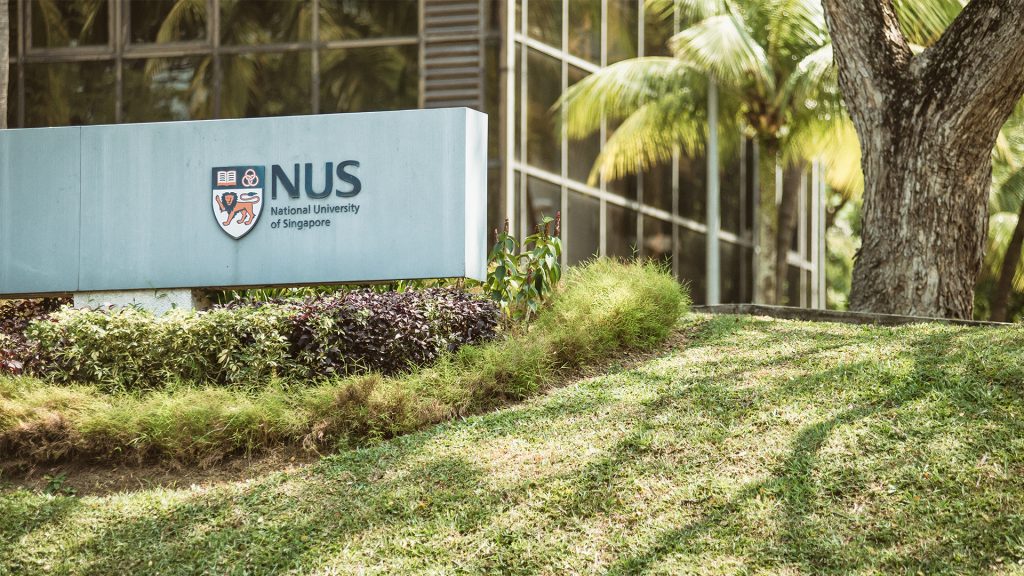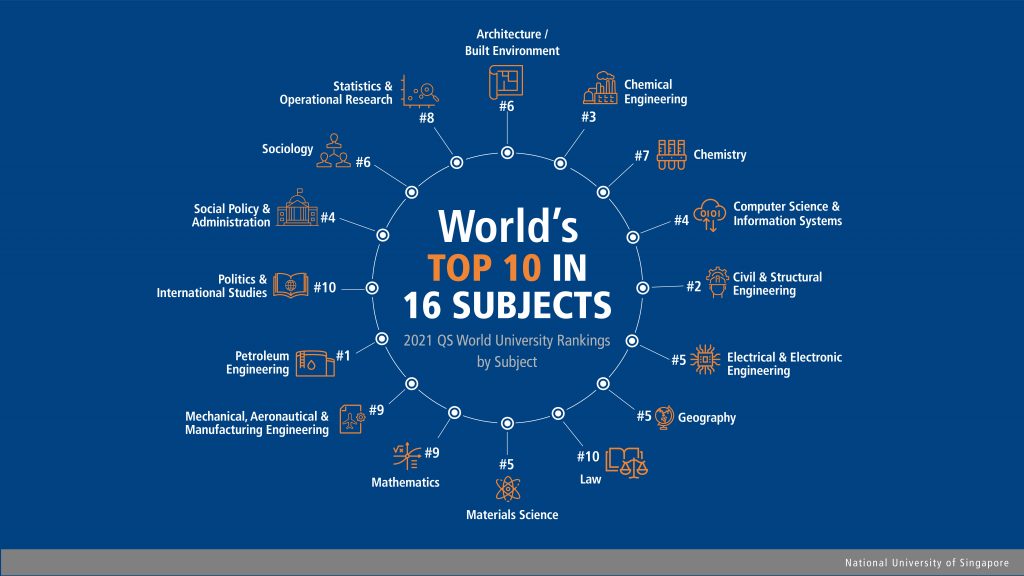NUS ranked top 10 globally in 16 subjects
March 5, 2021
IN BRIEF | 5 min read
- Sixteen NUS programmes are in the top 10 globally according to the Quacquarelli Symonds (QS) World University Rankings by Subject 2021
- NUS programmes in Computer Science, Engineering, Science, Arts and Social Sciences, Design and Environment, and Law are in the top 10
- Overall, NUS is among the top 20 for 28 out of the 37 programmes in which it was ranked

NUS’ academic programmes are among the top in the world, according to the Quacquarelli Symonds (QS) World University Rankings by Subject 2021. The latest rankings saw 16 NUS programmes placed in the top 10 globally, up from four in 2020.
The rankings, compiled by QS, provide independent comparative analysis on the performance of 13,883 individual university programmes, taken by students at 1,440 universities across the world. The programmes are across 51 academic disciplines and five broad Faculty Areas.
NUS’ programmes in the areas of Computer Science, Engineering, Science, Arts and Social Sciences, Design and Environment, and Law were placed in the top 10 in the 2021 rankings.

Senior Deputy President and Provost, Professor Ho Teck Hua, said, “We are delighted by the recognition that NUS continues to be among the top universities in Asia and the world. It is also heartening that the University was also placed among the world’s top-10 in all of the Engineering and Technology programmes it was ranked in, for the 2021 subject rankings. This is a wonderful achievement by our talented faculty members.”
Overall, NUS was placed in the top 20 for 28 out of the 37 programmes in which it was ranked.
Mr Ben Sowter, Senior Vice President of Professional Services at QS, said: “The consistent improvements made by Singaporean institutions in our rankings are the result of a decade of investment and strategising. NUS has the largest endowment of any university in Asia today. Advantaged by Singapore’s long-term preparation in their financial futures, and by a relentlessly international outlook, Singapore’s higher education is going from strength to strength.”
He added, “The QS rankings continue to demonstrate the relationship between funding, international outlook, and research performance – and Singaporean successes are entirely coherent with those established correlations.”
Building on the University’s world-class and diverse academic programmes, NUS continues to offer high impact programmes that will equip students with a wider range of problem-solving skills, and enhance their value in the workplace and the community at large.
In this respect, the University has launched the College of Humanities and Sciences to provide an enhanced undergraduate experience for students by building on the expertise of two of the largest and most established faculties in Singapore – the NUS Faculty of Arts and Social Sciences and the NUS Faculty of Science.
NUS has also announced a Common Curriculum for incoming freshmen to the NUS Faculty of Engineering, and the NUS School of Design and Environment. Students will be able to take courses from both schools seamlessly, and choose from new major-minor and double-major combinations that bridge the domains of engineering as well as design and the environment.
“Our goal is to nurture our students to be all-rounded and well-grounded individuals who can lead positive changes in society. These interdisciplinary programmes will emphasise the ability to think, synthesise and integrate knowledge and insights across disciplines,” said Prof Ho.
List of NUS programmes in top 20 for the QS World University Rankings by Subject 2021
| NUS Programme | World Ranking |
| Petroleum Engineering | 1 |
| Engineering – Civil & Structural | 2 |
| Engineering – Chemical | 3 |
| Computer Science & Information Systems | 4 |
| Social Policy & Administration | 4 |
| Engineering – Electrical & Electronic | 5 |
| Geography | 5 |
| Materials Science | 5 |
| Architecture / Built Environment | 6 |
| Sociology | 6 |
| Chemistry | 7 |
| Statistics & Operational Research | 8 |
| Engineering – Mechanical, Aeronautical & Manufacturing | 9 |
| Mathematics | 9 |
| Law | 10 |
| Politics & International Studies | 10 |
| Environmental Sciences | 11 |
| Pharmacy & Pharmacology | 12 |
| Business & Management Studies | 12 |
| Accounting & Finance | 13 |
| Anthropology | 14 |
| History | 15 |
| Physics & Astronomy | 15 |
| Modern Languages | 16 |
| Psychology | 16 |
| Biological Sciences | 17 |
| Economics & Econometrics | 17 |
| Linguistics | 17 |
This story first appeared in NUSnews on 4 March 2021.

